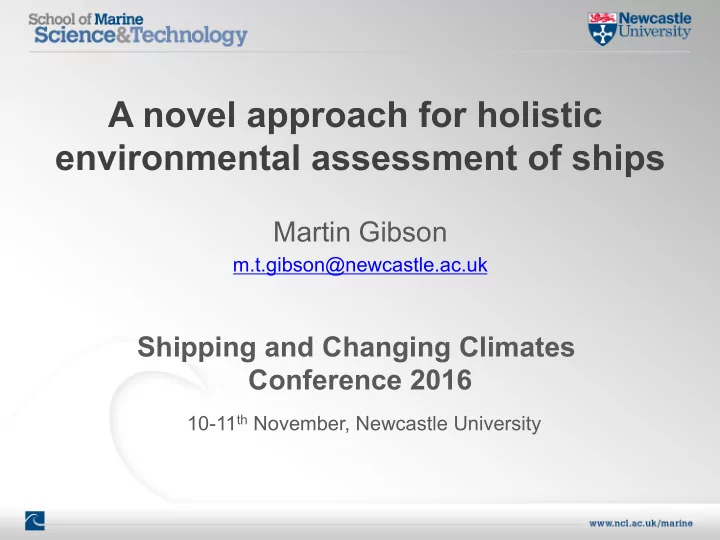

A novel approach for holistic environmental assessment of ships Martin Gibson m.t.gibson@newcastle.ac.uk Shipping and Changing Climates Conference 2016 10-11 th November, Newcastle University
Presentation Summary • Research Background • Aim and Objectives • Method of Assessment • Results • Proposal • Conclusions
Research Background • Independent environmental initiatives are increasingly common in the shipping sector – Initiatives have proliferated due to perception of global regulation as ‘conservative’ • Initiatives can: – Boost environmental credentials – Bridge the time gap between adoption of regulation and when it enters force • Previous work suggests weaknesses of some existing indices (Murphy et al., 2013) Reference: Murphy, A. J. Landamore, M. J. Pazouki, K. & Gibson, M. (2013) Modelling ship emission factors and emission indices. Low carbon shipping conference, London, 2013.
Aim and Objectives To propose a framework for assessing the environmental performance of ships using a holistic approach. • Critical analyses of existing environmental indices. • Identify limitations • New approach
Method of Assessment Analysis of Proposed Limitations indices approach Categorisation of Holistic initiatives Flexible Indices identification environmental scope Indices formulation: Applicable to range of Indicators vessel types Weightings Scoring range
Total = 67
Definition of environmental performance index (Svensson & Andersson, 2011): “an index of aggregated environmental data or indicators for the purpose of communicating a ships or shipping company’s environmental performance” • Does it assess multiple environmental criteria? • Can it differentiate environmental performance using a rating system? Reference: Svensson, E. & Andersson, K. (2011) Inventory and Evaluation of Environmental Performance Indices for Shipping. International Association of Maritime Economics Conference 2012. [Online] Available from: http://publications.lib.chalmers.se/records/ fulltext/162305.pdf (accessed 19/02/2016)
Type of Ini+a+ve Environmental indicators Single Mul+ple Index/ra)ng system 2 3 Financial 15 2 Incen)ve Award 1 5 Eco Label 3 10 Regula)on 3 1 Other e.g. research projects, 22 new technologies etc. Clean Shipping Index (CSI) Clean Cargo Working Group Scorecard & Performance Metrics Tool (CCWG) Environmental Ship Index (ESI)
Strengths/weaknesses & limitations – Individual environmental indicators – Relative importance of indicators – Environmental ambition
Index Environmental Indicator Rela+ve weigh+ng (%) CSI: equal weighting NO X 20 CCWG: weighted in favour of CO 2 SO X 20 CSI CO 2 20 ESI: weighted in favour of NO X Chemicals 20 Water & waste 20 NO X 10 SO X 20 • Indices ‘favourable’ towards certain CO 2 40 indicators CCWG Use of EMS 10 Waste, water & chemicals 10 • No justification for weightings Transparency 10 NO X 59 • Not an effective representation of SO X 28 overall environmental performance ESI CO 2 3 OPS 10
NO X ESI most ‘ambitious’ SO X For NO X : CSI, CCWG do not encourage emission reductions beyond regulatory requirements
• Not applicable to all ship types, locations • Rationale of scoring methods unclear • Bias to certain environmental indicators • Lack of environmental ambition • Narrow environmental scope
• Holistic method of environmental assessment • Applicable to all vessel types • Broad, relevant environmental scope based on impacts • Flexible mechanism to determine indicator weightings • Environmentally ambitious methodology
Framework SCOPE CONCEPTUAL MODEL SOURCE ENVIRONMENTAL ENVIRONMENTAL HAZARD PATHWAY INTERACTION IMPACT RECEPTOR Iden)fy Environmental Spa)al extent of impact Impact Covered by legisla)on Impact on flora/fauna Es)mate Severity Impact on landscape/infrastructure of Impact Visual impact SHIP QUESTIONNAIRE Vessel type, size, GT etc. Es)mate Occurs in normal shipping opera)on Installed technology Likelihood of Interacts with environment during normal Fuel type Occurrence shipping opera)on Loca)on (flag) Evaluate etc. Significance of SHIP ENVIRONMENTAL Impact INDEX Rank Ship performance data Environmental Efficiency assessment (e.g. Hazards use of available technology for reduc)ons etc.) Ship interac)ons with the environment
Conclusions • Limitations with existing environmental indices • Not good indicators of ships’ overall environmental performance • Holistic framework proposed for developing future indices – Flexible – Effective – Ambitious
Thank You
Recommend
More recommend